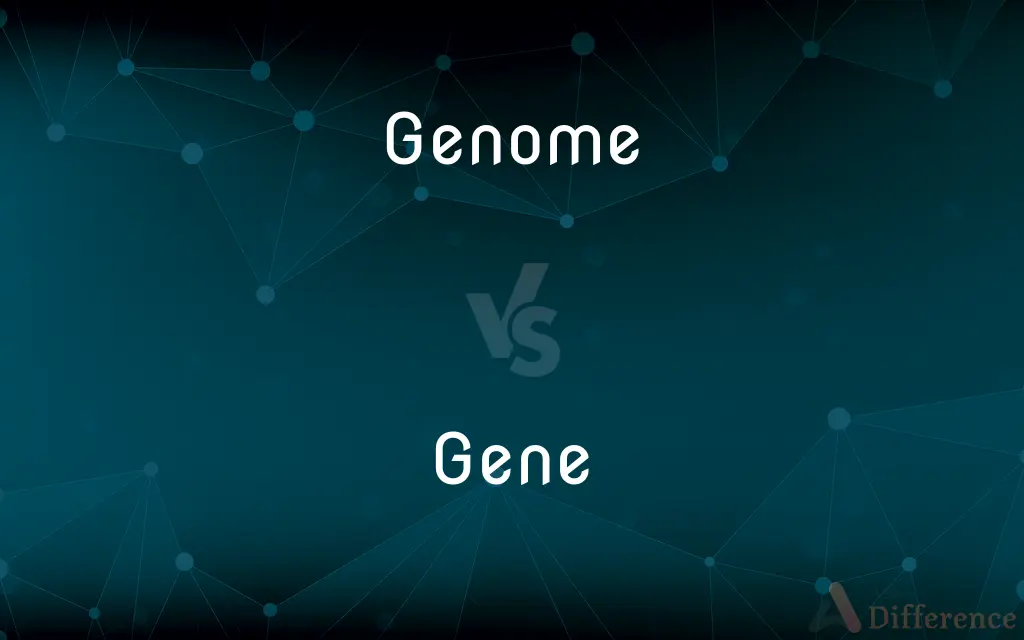Genome vs. Gene — What's the Difference?
By Maham Liaqat & Fiza Rafique — Updated on April 8, 2024
Genome is the complete set of DNA in an organism, encompassing all its genes, while gene is a specific sequence of DNA that codes for a protein, contributing to traits and functions.

Difference Between Genome and Gene
Table of Contents
ADVERTISEMENT
Key Differences
A genome encompasses the entirety of an organism's hereditary information encoded in DNA, including all of its genes and non-coding sequences. On the other hand, a gene is a segment of DNA that contains the instructions for producing a specific protein or RNA molecule, playing a critical role in determining the characteristics and functioning of an organism.
While the genome acts as the comprehensive blueprint for an organism, detailing every genetic aspect from physical traits to susceptibility to certain diseases, genes are the individual instructions within this blueprint, focusing on specific attributes or processes. The relationship between genome and gene is akin to a library containing a vast collection of books (genome) with each book representing a gene.
The study of genomes, genomics, involves analyzing the structure, function, evolution, and mapping of genomes, providing a broad understanding of an organism's complete genetic makeup. In contrast, genetics focuses more on the study of individual genes and their roles in inheritance, including how traits are passed from one generation to the next.
Genomes vary greatly in size and complexity across different organisms, reflecting the diversity of life. For instance, human genomes contain approximately 3 billion base pairs of DNA, housing an estimated 20,000 to 25,000 genes. Genes, however, vary in length and complexity, with each coding for a specific protein or function.
The concept of a genome highlights the interconnectedness of all genetic information within an organism, emphasizing the system's complexity and how genetic variations can influence overall health and development. Conversely, genes offer a more focused perspective, revealing how individual traits and functions are genetically determined and expressed.
ADVERTISEMENT
Comparison Chart
Definition
The complete set of DNA in an organism, including all genes.
A specific sequence of DNA that codes for a protein.
Scope
Encompasses all genetic material.
Focuses on individual traits and functions.
Study Field
Genomics.
Genetics.
Role in Organism
Provides the full genetic blueprint.
Dictates specific characteristics or functions.
Variation
Varies widely among different organisms.
Varies in size and complexity within an organism's genome.
Compare with Definitions
Genome
Reflects the complexity of life.
Studying diverse genomes helps scientists understand evolutionary relationships.
Gene
Codes for proteins or RNA.
This gene codes for a protein essential for muscle function.
Genome
Basis for genomic studies.
Genome studies have revolutionized personalized medicine.
Gene
Can be dominant or recessive.
Brown eye color is a dominant gene trait.
Genome
Varies in size across species.
The size of a plant genome can be much larger than that of a human.
Gene
Subject to mutations.
A mutation in this gene causes a specific genetic disorder.
Genome
The entirety of an organism's genetic material.
Scientists sequenced the human genome to understand genetic diseases.
Gene
Plays a role in inherited traits.
Hereditary diseases are often linked to specific gene mutations.
Genome
Includes both genes and non-coding DNA.
Non-coding regions of the genome play roles in gene regulation.
Gene
A unit of heredity in living organisms.
The gene for eye color can vary, resulting in different colors.
Genome
In the fields of molecular biology and genetics, a genome is all genetic material of an organism. It consists of DNA (or RNA in RNA viruses).
Gene
In biology, a gene (from genos (Greek) meaning generation or birth or gender) is a basic unit of heredity and a sequence of nucleotides in DNA or RNA that encodes the synthesis of a gene product, either RNA or protein.During gene expression, the DNA is first copied into RNA. The RNA can be directly functional or be the intermediate template for a protein that performs a function. The transmission of genes to an organism's offspring is the basis of the inheritance of phenotypic traits.
Genome
The total genetic content contained in a haploid set of chromosomes in eukaryotes, in a single chromosome in bacteria or archaea, or in the DNA or RNA of viruses.
Gene
(in informal use) a unit of heredity which is transferred from a parent to offspring and is held to determine some characteristic of the offspring
Playing tennis is in my genes
Genome
An organism's genetic material.
Gene
A hereditary unit consisting of a sequence of DNA that occupies a specific location on a chromosome and is transcribed into an RNA molecule that may function directly or be translated into an amino acid chain. Genes undergo mutation when their DNA sequences change.
Genome
(genetics) The complete genetic information (either DNA or, in some viruses, RNA) of an organism.
Gene
(genetics) A theoretical unit of heredity of living organisms; a gene may take several values and in principle predetermines a precise trait of an organism's form (phenotype), such as hair color.
Genome
The ordering of genes in a haploid set of chromosomes of a particular organism; the full DNA sequence of an organism;
The human genome contains approximately three billion chemical base pairs
Gene
(molecular biology) A segment of DNA or RNA from a cell's or an organism's genome, that may take several forms and thus parameterizes a phenomenon, in general the structure of a protein; locus.
A change in a gene is reflected in the protein or RNA molecule that it codes for.
Gene
(genetics) a segment of DNA that is involved in producing a polypeptide chain; it can include regions preceding and following the coding DNA as well as introns between the exons; it is considered a unit of heredity;
Genes were formerly called factors
Common Curiosities
How do genomes differ among organisms?
Genomes differ in size, complexity, and content across different organisms, reflecting the diversity of life.
What is the relationship between genes and proteins?
Genes contain the instructions for synthesizing proteins, which perform a wide range of functions in the body.
What is a gene?
A gene is a segment of DNA that encodes the information necessary to produce a protein or RNA molecule, influencing specific traits or functions.
Can changes occur in a genome?
Yes, genomes can undergo mutations and recombination, leading to genetic variation within a population.
How does genetics differ from genomics?
Genetics focuses on the study of individual genes and their effects on inheritance, while genomics examines the entire genome and its interactions.
Can a single gene influence multiple traits?
Yes, a phenomenon known as pleiotropy occurs when one gene influences multiple, seemingly unrelated traits.
How do environmental factors interact with genes?
Environmental factors can influence gene expression and trigger genetic predispositions to certain conditions.
How are genes inherited?
Genes are inherited from both parents, with each parent contributing one allele for every gene, which can result in various trait expressions.
What is a genome?
A genome is the complete set of an organism's DNA, including all of its genes and non-coding sequences.
Why are genes important?
Genes are crucial for determining an organism's traits, including physical characteristics, behavior, and susceptibility to diseases.
What role do non-coding regions of the genome play?
Non-coding regions regulate gene expression, influence the genome's structure, and contribute to its evolution.
What is a genetic mutation?
A genetic mutation is a change in the DNA sequence of a gene, which can affect the gene's function.
What is gene therapy?
Gene therapy is a medical technique that involves modifying genes within an individual's cells to treat or prevent disease.
Why is the study of genomes important?
Studying genomes helps scientists understand the genetic basis of diseases, evolution, and biological diversity, leading to advances in medicine and biology.
How are genomes sequenced?
Genomes are sequenced using technologies that read the sequences of DNA bases in an organism's genetic material.
Share Your Discovery

Previous Comparison
Wig vs. Weave
Next Comparison
Running vs. JoggingAuthor Spotlight
Written by
Maham LiaqatCo-written by
Fiza RafiqueFiza Rafique is a skilled content writer at AskDifference.com, where she meticulously refines and enhances written pieces. Drawing from her vast editorial expertise, Fiza ensures clarity, accuracy, and precision in every article. Passionate about language, she continually seeks to elevate the quality of content for readers worldwide.














































